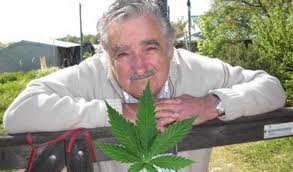 Uruguay & Guatemala pushes on with legalization, the US escalates crackdown, Oregon MJ qualifies for November ballot, Drug abuse down 50% in post-decriminalization Portugal
Uruguay & Guatemala pushes on with legalization, the US escalates crackdown, Oregon MJ qualifies for November ballot, Drug abuse down 50% in post-decriminalization Portugal
This week brought goods news and bad news for drug policy reform in the US and in Latin America:
Marijuana legalization project in Uruguay
The Uruguayan government is getting ready to send its marijuana legalization proposal to parliament for debate. That’s for the good news; the project is plugging along. The bad news is that so far only 24% of the Uruguay population support the proposal; President Mujica would like to get 60% approval to finalize the proposal, counting on widening support as the debates unfolds, a steep uphill educational battle ahead!
President Mujica announced today that he will tour the country to explain his proposal, emphasizing that his objective is to reduce drug-related crime. http://www.infobae.com/notas/659981-Pepe-Mujica-ratifico-que-buscara-legalizar-la-marihuana-en-Uruguay.html
Uruguay needs our support. Underneath is the link to the petition in support of the marijuana legalization project. Share on social networks and email. http://www.world-war-d.com/2012/06/22/petition-in-support-of-the-controlled-legalization-of-marijuana-in-uruguay/
Guatemala moving ahead on drug legalization debate
In Guatemala, President Perez Molina is moving ahead. On July 3, he became the first serving head of state to sign the Beckley Public Letter, calling for a paradigm shift in drug policy, joining seven former head of states Kofi Annan, and a slate of high-profile personalities. President Molina also launched the Beckley Foundation Guatemala, in order to assist in the development of new and more effective drug policies. Guatemala wants to build the case for a regional coalition for drug policy reform, a long a tedious, but necessary process. http://www.beckleyfoundation.org/2012/07/02/president-otto-perez-molina-launches-beckley-foundation-in-guatemala/
At the impulse of Guatemala, drug legalization will be discussed in more details at the upcoming SICA meeting of regional heads of states. http://m.laprensagrafica.com/2012/07/16/legalizacion-de-drogas-de-nuevo-a-debate/
The time has come to renew our support for the Guatemalan leading role in drug policy reform. If you haven’t done so yet, please sign the petition: http://signon.org/sign/support-guatemalan-president. Help spread it through social networks and emails.
In El Salvador, where the Catholic Church is a powerful force, the Archbishop of San Salvador, José Luis Escobar, called for a deepening debate on legalization during a press-conference on July 8. http://www.s21.com.gt/internacionales/2012/07/08/aboga-debatir-despenalizacion-droga
Marijuana legalization on the ballot in Oregon, Fed escalates crackdown on medical mj
In the US, Oregon is the third state to put a marijuana legalization initiative on the ballot in November, joining Colorado and Washington State. http://www.katu.com/news/local/Marijuana-initiative-qualifies-for-Oregon-ballot-162446216.html
Mayor of Newark, New Jersey, Cory Booker joins a small but steadily growing group of vocal anti-drug war politicians. It looks like anti-prohibitionism is not such a vote-buster anymore. http://www.huffingtonpost.com/2012/07/16/cory-booker-drug-war_n_1676008.html
But Obama doesn’t seem to be getting the message, as medical marijuana crack-downs continue and even escalate, with Harborside, the largest dispensary in the world, despite the protests from Oakland city leaders. It is very hard to figure out why Obama, an avid pot smoker during his college-years, embarked on such a losing proposition. The crack-downs will not gain him any support in the center, while it certainly demobilizes and antagonizes some of its most faithful supporters, youths and liberals, who gathered in droves to support him in 2008, but will stay home next November. http://www.huffingtonpost.com/scott-morgan/obama-marijuana-harborside-health-center_b_1678701.html
http://articles.latimes.com/2012/jul/13/local/la-me-oakland-marijuana-20120713
Ask Obama to leave medical marijuana alone, as he promised in 2008: http://www.whitehouse.gov/contact/submit-questions-and-comments
And in case you needed it, here is another illustration of the total idiocy of prohibition: http://news.nationalpost.com/2012/07/13/mexican-drug-cartels-spreading-influence-graphic/
Meanwhile, Portugal has seen a 50% drop in drug abuse since the decriminalization of drug use and widespread adoption of harm reduction measures in 2001; drug-related crime dropped even further. http://www.forbes.com/sites/erikkain/2011/07/05/ten-years-after-decriminalization-drug-abuse-down-by-half-in-portugal/. If you read Portuguese: http://www.cmjornal.xl.pt/detalhe/noticias/nacional/saude/a-toxicodependencia-esta-a-diminuir For more detailed analysis: http://academiajurisprudenciapr.org/wp-content/uploads/2012/03/Puerto-Rico-Marzo-06-2012.pdf. Need more evidence than prohibition doesn’t work?
And in case you needed it, here is another illustration of the total idiocy of prohibition: http://news.nationalpost.com/2012/07/13/mexican-drug-cartels-spreading-influence-graphic/
New Action: Mark your calendar
Mark your calendar and get ready to participate in what could become one of the largest event for drug policy reform: Javier Sicilia and Mexico’s Movement for Peace with Justice and Dignity will lead a caravan across the United States this summer, calling for an end to the drug war. The caravan will begin in San Diego this August and will visit two dozen U.S. cities on its way to Washington, DC. http://www.globalexchange.org/mexico/caravan
Ongoing activist actions:
The time has come to renew our support for the Guatemalan leading role in drug policy reform. If you haven’t done so yet, please sign the petition: http://signon.org/sign/support-guatemalan-president. Help spread it through social networks and emails.
Uruguay needs our support more than ever. Share on social networks and email. http://www.world-war-d.com/2012/06/22/petition-in-support-of-the-controlled-legalization-of-marijuana-in-uruguay/
Obama needs to hear from you. Ask him to leave medical marijuana alone: http://www.whitehouse.gov/contact/submit-questions-and-comments
Stay tuned and keep up the fight. Thank you for your support.
Jeffrey Dhywood
Investigative writer,
Author of “World War D – The Case against prohibitionism, roadmap to controlled re-legalization”
Download a free 42 pages excerpt of “World war-D”
Facebook page: http://www.facebook.com/worldward
Follow me on Twitter: @JDhywood
Become a better informed activist and support global drug policy reform! I do not ask for donations, I invite you to order a book filled with valuable information.
Order your own copy of “Word War-D”
- The reference book on the War on Drugs and prohibitionism
- A guide to psychoactive substances and substance abuse
- A blueprint for global drug policy reform and controlled legalization
(Click here to order “World War-D” from Amazon)
If you agree with our views, please share this message to support our cause. Send this message to at least 5 of your friends, post it on social networks, on your blogs, etc.
